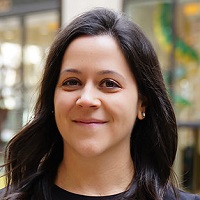Here's Why We All Win When Charitable Dollars Go to Women
Giving to charities for women and girls not only has a lasting impact on their lives — it also benefits society as a whole. Here’s how to start investing.

Profit and prosper with the best of Kiplinger's advice on investing, taxes, retirement, personal finance and much more. Delivered daily. Enter your email in the box and click Sign Me Up.
You are now subscribed
Your newsletter sign-up was successful
Want to add more newsletters?

Delivered daily
Kiplinger Today
Profit and prosper with the best of Kiplinger's advice on investing, taxes, retirement, personal finance and much more delivered daily. Smart money moves start here.

Sent five days a week
Kiplinger A Step Ahead
Get practical help to make better financial decisions in your everyday life, from spending to savings on top deals.

Delivered daily
Kiplinger Closing Bell
Get today's biggest financial and investing headlines delivered to your inbox every day the U.S. stock market is open.

Sent twice a week
Kiplinger Adviser Intel
Financial pros across the country share best practices and fresh tactics to preserve and grow your wealth.

Delivered weekly
Kiplinger Tax Tips
Trim your federal and state tax bills with practical tax-planning and tax-cutting strategies.

Sent twice a week
Kiplinger Retirement Tips
Your twice-a-week guide to planning and enjoying a financially secure and richly rewarding retirement

Sent bimonthly.
Kiplinger Adviser Angle
Insights for advisers, wealth managers and other financial professionals.

Sent twice a week
Kiplinger Investing Weekly
Your twice-a-week roundup of promising stocks, funds, companies and industries you should consider, ones you should avoid, and why.

Sent weekly for six weeks
Kiplinger Invest for Retirement
Your step-by-step six-part series on how to invest for retirement, from devising a successful strategy to exactly which investments to choose.
When it comes to making smart decisions with your philanthropic dollars, few causes offer the kind of return on investment that supporting women and girls can deliver. Research shows that when women and girls have access to education, health care and economic opportunities, entire communities thrive. Economies grow stronger, health outcomes improve and societies become more stable. If you're looking to align your charitable giving with long-term, high-impact goals, investing in women and girls is a smart choice.
Despite this, women and girls historically receive fewer resources. In fact, only 1.9% of charitable donations in the U.S. go to causes focused on women and girls. With so many critical issues competing for philanthropic dollars, women and girls are often overlooked, even though their success directly contributes to broader societal gains.
Recent high-profile donors like MacKenzie Scott and Melinda French Gates have drawn attention to this gap by making significant investments in women’s and girls’ causes. But the truth is, you don’t have to be a billionaire to make a meaningful difference. Here’s how everyday donors can get involved and make their philanthropic dollars work harder for women and girls.
Go local and support grassroots organizations
One of the most effective ways to maximize your giving is to invest in grassroots organizations that work directly in communities. These organizations are often the most connected to local needs and can tailor their programs to create an immediate impact.
From just $107.88 $24.99 for Kiplinger Personal Finance
Become a smarter, better informed investor. Subscribe from just $107.88 $24.99, plus get up to 4 Special Issues

Sign up for Kiplinger’s Free Newsletters
Profit and prosper with the best of expert advice on investing, taxes, retirement, personal finance and more - straight to your e-mail.
Profit and prosper with the best of expert advice - straight to your e-mail.
For example, consider supporting groups that work with and support community-led organizations that address pressing issues like education, health care and economic empowerment, such as Grantmakers for Girls of Color or MADRE. Supporting organizations that prioritize communities ensures your dollars have a direct and lasting impact on the lives of women and girls.
Take an intersectional approach
To make your giving go even further, consider the interconnected issues that affect women and girls, such as race, poverty and geography. Philanthropy that recognizes these multiple layers of identity and challenge is often more effective in creating long-term, systemic change.
An example of this approach is Black Girl Ventures, which helps Black and Brown women entrepreneurs by providing funding and community support. This kind of strategic giving addresses not just gender inequality but also racial and economic barriers, maximizing the broader societal impact.
Provide flexible, general support
When you give to an organization, consider making an unrestricted gift, meaning the funds aren’t tied to a specific program or project. This allows organizations to be flexible and respond quickly to the most pressing needs, whether that’s covering operational costs or adapting to unexpected challenges.
Organizations like the Ms. Foundation for Women advocate for trust-based philanthropy, where donors provide general operating support to help nonprofits sustain their work over the long haul. By offering flexible funding, you’re investing in the organization’s success and ensuring it has the resources to continue its mission.
Whether you’re a seasoned philanthropist or just starting your giving journey, investing in women and girls is an effective way to align your charitable contributions with a cause that delivers broad societal benefits. By supporting grassroots efforts, adopting an intersectional approach and providing flexible funding, you can help drive positive change while making a meaningful investment in the future of our world.
Elizabeth Droggitis joined Rockefeller Philanthropy Advisors in August 2017. As the Director of the Global Empowerment & Opportunities Practice Area on the Sponsored Projects & Funds team, she manages a portfolio of projects focused on issues of international development, human rights, economic opportunity, gender and more. In particular, Elizabeth works on RPA’s projects centered on the rights of women and girls. Elizabeth provides key operational support to help each project work toward its mission, and she works closely with project leadership and funders to strengthen relationships and maximize impact.
Caroline Suozzi, as the Thought Leadership and Content Manager, develops thought leadership based on research, trends in the sector, donor education efforts and learning cohorts. Since joining RPA in 2019, Caroline has played an instrumental role in RPA’s marketing and communications initiatives. Previously, Caroline served as the Deputy Campaign Manager on the successful re-election of a top-targeted Democratic member of Congress. Before that, she spent a school year as a volunteer teacher at the Jesuit Yap Catholic High School on Yap Island in the Federated States of Micronesia.
Related Content
- Melinda French Gates Gives $1 Billion in Support of Women's Rights
- Melinda French Gates Models Three Strong Lessons for Philanthropists
- MacKenzie Scott Just Gave Away Another $640 Million. Here’s Where the Money Went
- Six Steps to Plan Your Charitable Giving
- How to Make a Charitable Plan That Won't Break Your Bank
Profit and prosper with the best of Kiplinger's advice on investing, taxes, retirement, personal finance and much more. Delivered daily. Enter your email in the box and click Sign Me Up.

Elizabeth joined Rockefeller Philanthropy Advisors in August 2017. As the Director of the Global Empowerment & Opportunities Practice Area on the Sponsored Projects & Funds team, she manages a portfolio of projects focused on issues of international development, human rights, economic opportunity, gender and more. In particular, Elizabeth works on RPA’s projects centered on the rights of women and girls. Elizabeth provides key operational support to help each project work toward its mission, and she works closely with project leadership and funders to strengthen relationships and maximize impact.
-
 Nasdaq Leads a Rocky Risk-On Rally: Stock Market Today
Nasdaq Leads a Rocky Risk-On Rally: Stock Market TodayAnother worrying bout of late-session weakness couldn't take down the main equity indexes on Wednesday.
-
 Quiz: Do You Know How to Avoid the "Medigap Trap?"
Quiz: Do You Know How to Avoid the "Medigap Trap?"Quiz Test your basic knowledge of the "Medigap Trap" in our quick quiz.
-
 5 Top Tax-Efficient Mutual Funds for Smarter Investing
5 Top Tax-Efficient Mutual Funds for Smarter InvestingMutual funds are many things, but "tax-friendly" usually isn't one of them. These are the exceptions.
-
 Nasdaq Leads a Rocky Risk-On Rally: Stock Market Today
Nasdaq Leads a Rocky Risk-On Rally: Stock Market TodayAnother worrying bout of late-session weakness couldn't take down the main equity indexes on Wednesday.
-
 5 Top Tax-Efficient Mutual Funds for Smarter Investing
5 Top Tax-Efficient Mutual Funds for Smarter InvestingMutual funds are many things, but "tax-friendly" usually isn't one of them. These are the exceptions.
-
 Why Invest In Mutual Funds When ETFs Exist?
Why Invest In Mutual Funds When ETFs Exist?Exchange-traded funds are cheaper, more tax-efficient and more flexible. But don't put mutual funds out to pasture quite yet.
-
 Social Security Break-Even Math Is Helpful, But Don't Let It Dictate When You'll File
Social Security Break-Even Math Is Helpful, But Don't Let It Dictate When You'll FileYour Social Security break-even age tells you how long you'd need to live for delaying to pay off, but shouldn't be the sole basis for deciding when to claim.
-
 I'm an Opportunity Zone Pro: This Is How to Deliver Roth-Like Tax-Free Growth (Without Contribution Limits)
I'm an Opportunity Zone Pro: This Is How to Deliver Roth-Like Tax-Free Growth (Without Contribution Limits)Investors who combine Roth IRAs, the gold standard of tax-free savings, with qualified opportunity funds could enjoy decades of tax-free growth.
-
 One of the Most Powerful Wealth-Building Moves a Woman Can Make: A Midcareer Pivot
One of the Most Powerful Wealth-Building Moves a Woman Can Make: A Midcareer PivotIf it feels like you can't sustain what you're doing for the next 20 years, it's time for an honest look at what's draining you and what energizes you.
-
 Stocks Make More Big Up and Down Moves: Stock Market Today
Stocks Make More Big Up and Down Moves: Stock Market TodayThe impact of revolutionary technology has replaced world-changing trade policy as the major variable for markets, with mixed results for sectors and stocks.
-
 I'm a Wealth Adviser Obsessed With Mahjong: Here Are 8 Ways It Can Teach Us How to Manage Our Money
I'm a Wealth Adviser Obsessed With Mahjong: Here Are 8 Ways It Can Teach Us How to Manage Our MoneyThis increasingly popular Chinese game can teach us not only how to help manage our money but also how important it is to connect with other people.

